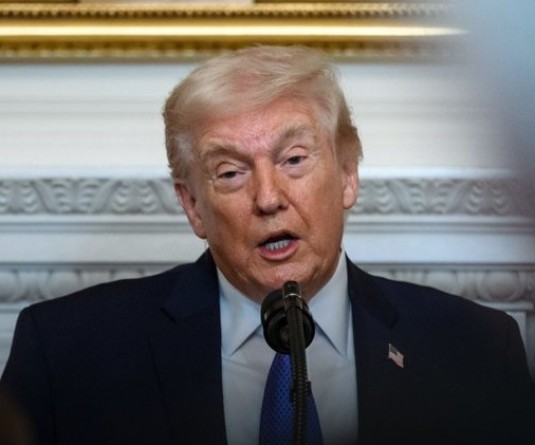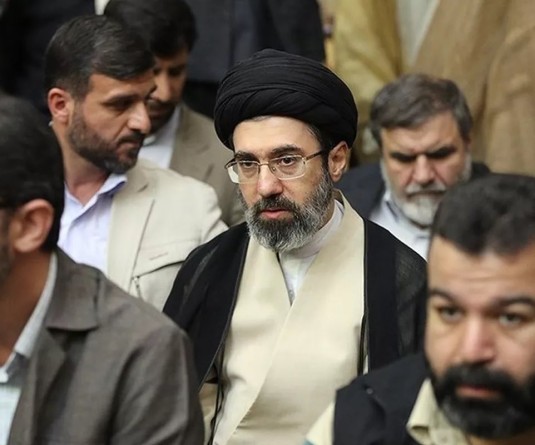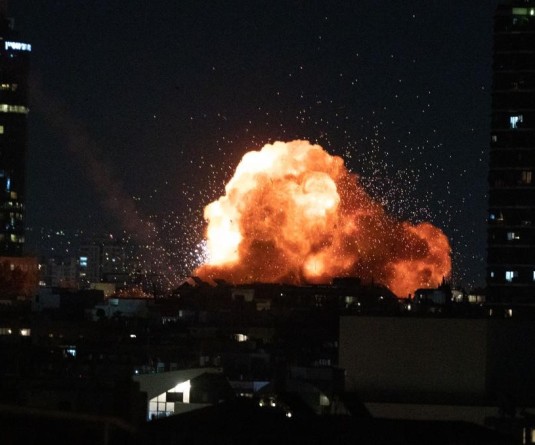
LONDON, February 8 (BBC): There are competing visions on offer of what has been happening in Egypt, as this extraordinary political stalemate drags on.
The people of the country, already shocked by the way political dissent suddenly erupted here after decades of repression, almost find themselves contemplating parallel realities.
On the one hand, there is the distinctly optimistic view of the government that after a little reshuffling and restructuring under pressure in the last two weeks, things are getting back to normal.
And on the other there is the protesters' vision that President Hosni Mubarak is tottering, fatally weakened and that one final push will get rid of him.
The official government view does seem to err on the side of optimism.
It is a very peculiar kind of normality that sees troops and tanks on the streets and a huge carnival of protest now seemingly establishing itself as a permanent feature of life in the capital's main square.
Back to work
Somewhere in the middle you find ordinary Egyptians trying to get back to work. That is what we found when we went out to a suburban factory, the Cairo Cotton Centre, and asked people - as you do here these days - what sort of revolution they had had.
In the case of Tarek Eid Ibrahim, the answer was that he had had rather an eventful one. When he heard the first reports that the political demonstrations in the centre of Cairo had triggered widespread looting, he was one of a number of staff who voluntarily went down in the middle of the night to protect the factory.
"When we heard the sound of gunfire, we fired warning shots in return," he told me.
Tarek and his friends were literally prepared to fight for their jobs, an indication of how desperate people here are for steady, well-paid work. If Egypt is to have a successful economic future then it is going to need factories like this to prosper, and it is going to need more of them.
It is the business end of globalisation - if you buy your T-shirts from Calvin Klein or Gap or Marks and Spencer there is a fair chance they are made here.
The same applies to jeans with American labels which you buy from shops in Japan. The job is important to Abeir Samir Mohammed too. She listened to the news on radio and television with excitement, but with a degree of fear too. She was worried for her safety as a woman, with rumours of lawlessness spreading.
"I want change," she told us, "but I don't want things to go to fast."
Egypt has been a totalitarian society for so long now that people like Abeir and Tarek are used to having their voices ignored, although if this country is really to have free elections in September that will change.
For the factory owner, Magdy Tolba, though, the more interesting question is how much change will come and on whose terms.
He says he sympathises with some of the grievances which have fuelled the demonstrations in Tahrir Square, especially the basic ones like rising food prices.
But he does not think it would be a democratic outcome if the protesters got to decide what sort of Egypt should emerge from the current state of chaos.
"There is not a single person in this country who isn't looking for freedom and reform and better standards of living and everyone has the right to demonstrate," he told me.
"But they don't have the right to destroy. How can the protesters, if they're a few thousand, even a million, take a decision for 85 million Egyptians?"
'Too much destruction'
Like any successful businessman anywhere, Magdy - who was once invited to give a presentation on the cotton industry in person to Mr Mubarak - says he does not want much from politicians beyond stability.
And that is his message for the demonstrators too.
"This will all cost image and respect," he told me. "This destruction is too much. Those young guys are underestimating the impact. Somebody has to be realistic."
We had gone to the factory to get a sense of how ordinary Egyptians who have lived through these extraordinary days see the immediate future.
The answer seemed to be that no-one feels confident that they know what is going to happen next.
A totalitarian administration that has clung to power for decades has been rattled by a sudden explosion of unrest, but it certainly has not conceded that its reign is over.
Mr Mubarak is a fighter - and some Egyptians certainly still like him.
His central tactic now - of acting as though he is restoring normality to the daily life - is a good one. Plenty of Egyptians might be tempted to settle for a bit of change now, the promise of more to come in the future and the chance to resume their ordinary lives in the meantime.
And the opposition that has galvanised this society with its energy has much to prove - and has to meet the challenge of coming up with coherent policies and credible candidates to fight the entrenched politicians of the establishment in time for elections in September.
To some extent, there is a degree of validity to both those competing visions and, whichever vantage point you choose - whether it is the Cairo Cotton Centre or Tahrir Square itself - it is hard to say which is going to prevail.
The people of the country, already shocked by the way political dissent suddenly erupted here after decades of repression, almost find themselves contemplating parallel realities.
On the one hand, there is the distinctly optimistic view of the government that after a little reshuffling and restructuring under pressure in the last two weeks, things are getting back to normal.
And on the other there is the protesters' vision that President Hosni Mubarak is tottering, fatally weakened and that one final push will get rid of him.
The official government view does seem to err on the side of optimism.
It is a very peculiar kind of normality that sees troops and tanks on the streets and a huge carnival of protest now seemingly establishing itself as a permanent feature of life in the capital's main square.
Back to work
Somewhere in the middle you find ordinary Egyptians trying to get back to work. That is what we found when we went out to a suburban factory, the Cairo Cotton Centre, and asked people - as you do here these days - what sort of revolution they had had.
In the case of Tarek Eid Ibrahim, the answer was that he had had rather an eventful one. When he heard the first reports that the political demonstrations in the centre of Cairo had triggered widespread looting, he was one of a number of staff who voluntarily went down in the middle of the night to protect the factory.
"When we heard the sound of gunfire, we fired warning shots in return," he told me.
Tarek and his friends were literally prepared to fight for their jobs, an indication of how desperate people here are for steady, well-paid work. If Egypt is to have a successful economic future then it is going to need factories like this to prosper, and it is going to need more of them.
It is the business end of globalisation - if you buy your T-shirts from Calvin Klein or Gap or Marks and Spencer there is a fair chance they are made here.
The same applies to jeans with American labels which you buy from shops in Japan. The job is important to Abeir Samir Mohammed too. She listened to the news on radio and television with excitement, but with a degree of fear too. She was worried for her safety as a woman, with rumours of lawlessness spreading.
"I want change," she told us, "but I don't want things to go to fast."
Egypt has been a totalitarian society for so long now that people like Abeir and Tarek are used to having their voices ignored, although if this country is really to have free elections in September that will change.
For the factory owner, Magdy Tolba, though, the more interesting question is how much change will come and on whose terms.
He says he sympathises with some of the grievances which have fuelled the demonstrations in Tahrir Square, especially the basic ones like rising food prices.
But he does not think it would be a democratic outcome if the protesters got to decide what sort of Egypt should emerge from the current state of chaos.
"There is not a single person in this country who isn't looking for freedom and reform and better standards of living and everyone has the right to demonstrate," he told me.
"But they don't have the right to destroy. How can the protesters, if they're a few thousand, even a million, take a decision for 85 million Egyptians?"
'Too much destruction'
Like any successful businessman anywhere, Magdy - who was once invited to give a presentation on the cotton industry in person to Mr Mubarak - says he does not want much from politicians beyond stability.
And that is his message for the demonstrators too.
"This will all cost image and respect," he told me. "This destruction is too much. Those young guys are underestimating the impact. Somebody has to be realistic."
We had gone to the factory to get a sense of how ordinary Egyptians who have lived through these extraordinary days see the immediate future.
The answer seemed to be that no-one feels confident that they know what is going to happen next.
A totalitarian administration that has clung to power for decades has been rattled by a sudden explosion of unrest, but it certainly has not conceded that its reign is over.
Mr Mubarak is a fighter - and some Egyptians certainly still like him.
His central tactic now - of acting as though he is restoring normality to the daily life - is a good one. Plenty of Egyptians might be tempted to settle for a bit of change now, the promise of more to come in the future and the chance to resume their ordinary lives in the meantime.
And the opposition that has galvanised this society with its energy has much to prove - and has to meet the challenge of coming up with coherent policies and credible candidates to fight the entrenched politicians of the establishment in time for elections in September.
To some extent, there is a degree of validity to both those competing visions and, whichever vantage point you choose - whether it is the Cairo Cotton Centre or Tahrir Square itself - it is hard to say which is going to prevail.






